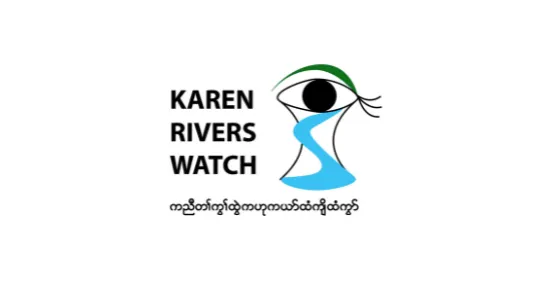Statement from Karen Rivers Watch for International Day of Action for Rivers and Against Dams
14 March 2024

March 14, 2024
For the past two decades, Karen Rivers Watch has spearheaded anti-dam campaigns aimed at opposing projects slated for construction on the Salween River. This river holds immense significance for the survival and well-being of the Karen people, particularly in light of the proposed Hatgyi Dam Project. Since its inception, local and indigenous communities have stood united in protest against this development.
The agreements for the dam project, signed without the consent of the affected communities by previous leaders, pose a grave threat to the future of indigenous peoples and the natural resources of the Salween River Basin. Karen Rivers Watch has persistently campaigned against the Hatgyi Dam to governments, investment firms, international organizations, collaborating with Karen civil society groups, and local communities in our efforts to protect the region’s environment and livelihoods.
Before the commencement of dam construction on the Salween River, preparatory activities such as road construction and military expansion in project areas have led to frequent armed clashes These conflicts have resulted in severe human rights violations, including forced displacement and labor, experienced by local communities. The escalating tensions along the Salween River Basin have also led to a rise in casualties, particularly among vulnerable groups such as the elderly, women, and children. Additionally, widespread damage to homes, disruptions to daily security, and forced relocations have further exacerbated the challenges faced by affected communities.
Internationally, indigenous peoples are increasingly acknowledged as vital contributors to climate change mitigation efforts, with their environmental stewardship gaining recognition. Moreover, the rights of indigenous communities are being upheld and integrated into policymaking and initiatives. Initiatives like the Salween Peace Park and the Thaw-Thi Taw Oo Indigenous Park in Kawthoolei exemplify indigenous peoples’ efforts to foster self-determination and sustainable governance.
Myanmar’s energy policy, driven by successive administrations and currently by the State Administrative Council (SAC), poses a threat to indigenous self-determination and governance systems. These policies, supported by international organizations, contribute to environmental degradation and exacerbate climate change. It is imperative that projects be implemented only with the active participation and decision-making power of local communities to mitigate their impact on the environment and social fabric.
The endeavor to fulfill Myanmar’s electricity requirements through dam construction projects, devoid of community participation in decision-making, is eroding the cultural heritage and traditional customary practices of indigenous and local peoples.
On this International Day of Action for Rivers, Karen Rivers Watch presents our demands regarding the Salween River dam projects and the future of Myanmar’s rivers. We call for the following:
For Ethnic Revolutionary Groups to:
(1) Oppose dam projects in their controlled areas which do not have community consent and resist any development endeavors exacerbating the plight of those affected by ongoing conflicts.
(2) Combat authoritarianism and the perpetuation of centralized systems which exploit the resources of ethnic groups, and advocate for the recognition and implementation of local administrative structures.
(3) Consider development projects suitable for the region only once the conflict ceases, centralized control ends, and ethnic groups are empowered to make autonomous decisions.
For the National Unity Consultative Council (NUCC) to:
(1) Respect indigenous rights and devise policies supporting a federal resource management system.
(2) Mobilize internationally and collaborate with civil society organizations to address environmental damage post-military coup.
(3) Investigate environmental damage during the military coup and implement appropriate remedial measures.
For International Organizations to:
(1) Promote localized green energy initiatives, emphasizing renewable projects with minimal environmental and social impacts.
(2) Provide humanitarian aid in partnership with ethnic civil society groups to assist those affected by the actions of the State Administrative Council (SAC) in Myanmar.
Contact:
Saw Eh Htee Kaw +66 962842513 (Signal) (Burmese, Karen)
Nan Ta Kaw Awar +95 9793930540 (Signal) (Burmese, English)
Announcements
28 February 2025
Asian NGO Network on National Human Rights Institutions , CSO Working Group on Independent National Human Rights Institution (Burma/Myanmar)
Open letter: Removal of the membership of the dis-accredited Myanmar National Human Rights Commission from the Southeast Asia National Human Rights Institution Forum
25 February 2025
သတင်းထုတ်ပြန်ကြေညာချက် – တရားမျှတမှုဆီရှေးရှုလျက် အာဂျင်တီးနားတရားရုံး၏ ဖမ်းဝရမ်းထုတ်ပြန်မှုကို ကြိုဆိုထောက်ခံ
25 February 2025
Press Statement: Argentine Court’s arrest warrants are welcome progress towards justice
21 February 2025
CSO Working Group on Independent National Human Rights Institution (Burma/Myanmar) , Asian NGO Network on National Human Rights Institutions (ANNI)
Open letter: Removal of the membership of the dis-accredited Myanmar National Human Rights Commission from the Asia Pacific Forum on National Human Rights Institutions

Progressive Voice is a participatory rights-based policy research and advocacy organization rooted in civil society, that maintains strong networks and relationships with grassroots organizations and community-based organizations throughout Myanmar. It acts as a bridge to the international community and international policymakers by amplifying voices from the ground, and advocating for a rights-based policy narrative.